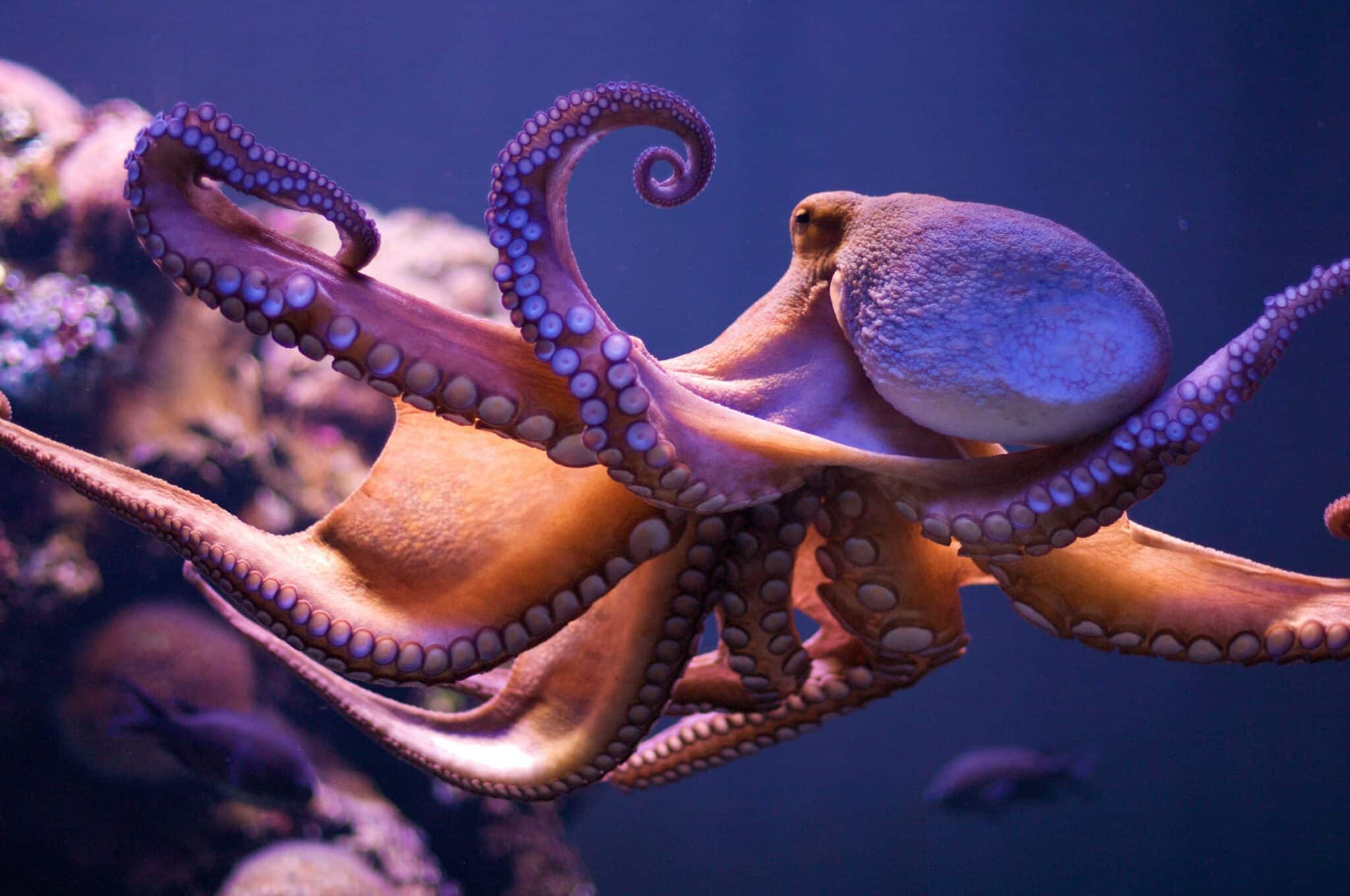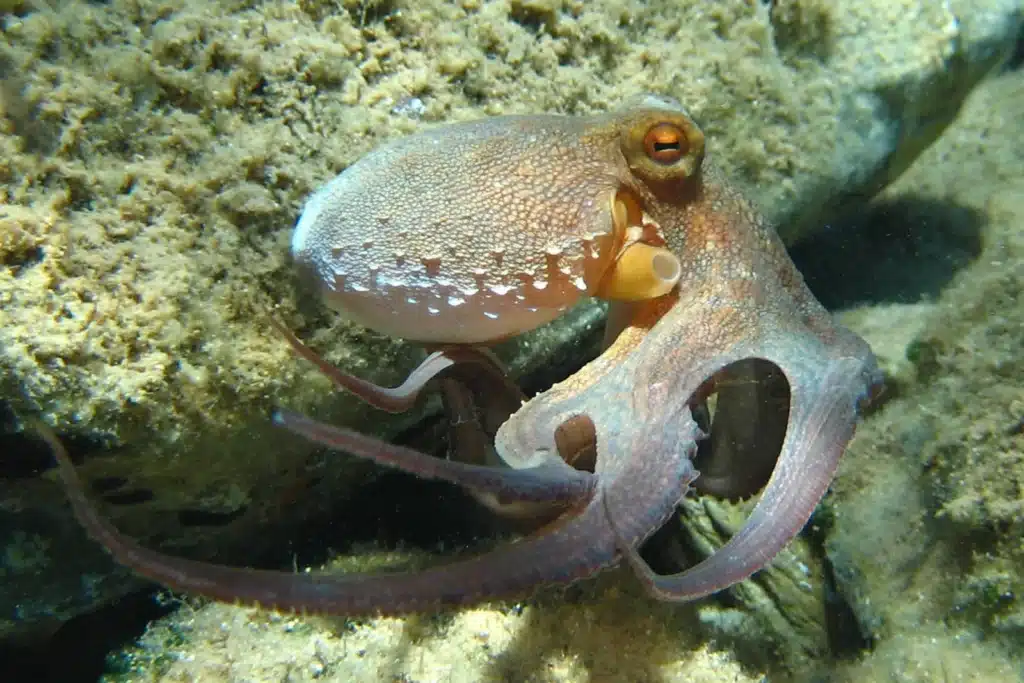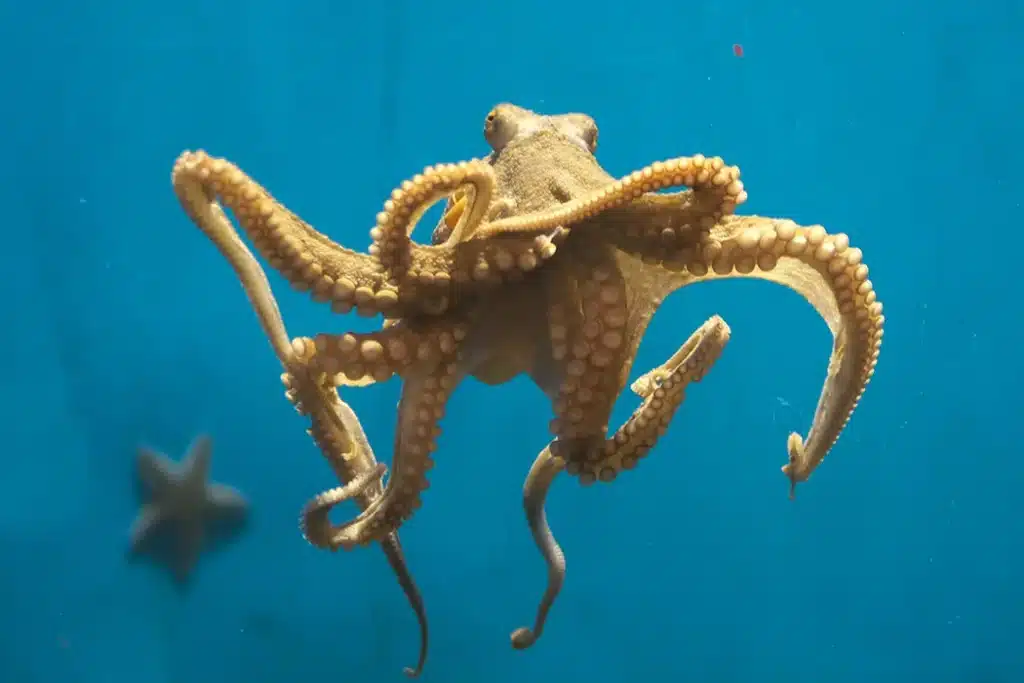Does Octopus Have Eyes

Introduction
Does Octopus Have Eyes: The octopus, one of the most enigmatic and intelligent creatures in the ocean, has long captured the curiosity of scientists and marine enthusiasts alike. These cephalopods, with their graceful movements and incredible problem-solving abilities, inhabit a realm that remains largely mysterious to us. Among the myriad questions about octopuses live, one that often surfaces is whether they possess eyes.
Octopus eyes are a testament to the wonders of evolution. Unlike many other animals, octopuses have eyes that are remarkably similar to those of humans and other vertebrates. These complex structures are strikingly similar in function and appearance, suggesting a shared evolutionary history.
The presence of eyes in octopuses raises intriguing questions about the extent of their visual capabilities. In this exploration of octopus vision, we will delve into the fascinating world of these underwater wonders, uncovering the truth about their eyes and shedding light on how these remarkable creatures perceive and interact with their environment. Join us on this journey as we dive deep into the ocean to unravel the mysteries of octopus eyes.

Can octopus see without eyes?
Octopus skin can sense light even without input from the eyes or brain.
The notion of creatures being able to “see” without conventional eyes may sound like the stuff of science fiction, but in the case of octopuses, it’s a reality that challenges our understanding of vision. While octopuses indeed possess eyes that are remarkably similar to those of humans, they also possess another remarkable sensory adaptation known as “skin vision.”
Skin vision allows octopuses to perceive their environment and respond to light and patterns through specialized pigment cells in their skin called chromatophores. These cells contain pigments that can expand or contract, creating a wide range of colors and patterns. Octopuses can change the color and texture of their skin rapidly, effectively becoming chameleons of the ocean.
While skin vision is not the same as the visual perception we associate with eyes, it is a form of sensory information that enables octopuses to detect light and patterns in their surroundings. This ability is particularly important for camouflage, communication, and even hunting, as they can blend into their surroundings, signal to other octopuses, and track prey.
In this way, octopuses demonstrate a remarkable versatility in their sensory capabilities, challenging our traditional understanding of how creatures “see.” It’s a testament to the ingenuity of evolution and the incredible adaptability of these enigmatic creatures, reminding us that the natural world is full of surprises and mysteries waiting to be unraveled.
Are octopus eyes better than human eyes?
Also, they have many more photoreceptors than vertebrates, at roughly 20,000-50,000/mm2 which means that their vision is much better than that of any human.
Octopus eyes and human eyes have evolved in distinct ways to suit their respective environments and lifestyles, making direct comparisons challenging. Octopus eyes excel in certain aspects, but whether they are “better” than human eyes depends on the specific criteria used for evaluation.
Octopus eyes are known for their excellent light sensitivity, allowing them to see well in low-light conditions, including the deep ocean. Their eyes are also highly adaptable, capable of detecting polarized light and adjusting rapidly to different light levels. In contrast, human eyes are adapted for color vision and high-resolution detail, making us exceptional at discerning intricate patterns, colors, and shapes.
Octopuses possess a wide field of vision, often exceeding that of humans. Their eyes, which do not have blind spots, can rotate independently, granting them panoramic views of their surroundings. In comparison, humans have binocular vision, which provides depth perception but with a narrower field of view.
So, whether octopus eyes are “better” than human eyes depends on the context. Octopus eyes excel in low-light environments and offer unique capabilities, such as a wide field of vision and adaptability to changing light conditions. In contrast, human eyes excel in tasks requiring color discrimination, fine detail recognition, and depth perception. Both are marvels of evolution, finely tuned to the needs of their respective owners and environments.
Do all octopus have eyes?
An octopus’s bag- shaped body, or mantle, contains organs such as kidneys, a liver, gills, a stomach, an intestine, a brain, and reproductive organs. On top of its head, an octopus has two eyes that are structurally similar to human eyes; it has relatively good eyesight.
Not all octopuses have eyes, as the presence of eyes varies among different species within the octopus family. While many octopus species are indeed equipped with eyes, there are some intriguing exceptions.
The majority of octopuses possess well-developed eyes that are remarkably similar to those of humans and other vertebrates. These eyes are capable of discerning shapes, colors, and movement, making them vital tools for hunting, navigation, and communication in the underwater world. Octopuses with eyes rely on visual cues to interpret their surroundings and interact with other creatures.
However, some species of octopuses have evolved to thrive in environments where eyes would be of little use. These species often inhabit extreme depths of the ocean, where there is very little to no light. In such dark realms, eyes would be ineffective, so these octopuses have lost their eyesight over time through the process of evolution. Instead, they rely on other sensory adaptations, such as heightened sensitivity to touch and chemical cues, to navigate and hunt in their lightless habitats.
The presence or absence of eyes in octopuses is a result of their evolutionary adaptations to their specific ecological niches. While most octopus species possess eyes, those inhabiting the deep ocean have sacrificed this sense in favor of other survival strategies better suited to their dark, mysterious world.
Can octopus see color?
Octopuses, squid and other cephalopods are colorblind – their eyes see only black and white – but their weirdly shaped pupils may allow them to detect color and mimic the colors of their background, according to a father/son team of researchers from the University of California, Berkeley, and Harvard University.
Octopuses, intriguing creatures of the deep, possess a remarkable ability to perceive and interact with their surroundings. However, when it comes to color vision, their capabilities differ from those of humans. Unlike us, octopuses are not trichromats, meaning they do not possess three types of color receptors (cones) sensitive to red, green, and blue wavelengths of light. Instead, they are considered dichromats, equipped with just two types of cones, making them primarily sensitive to blue and green hues.
This adaptation is well-suited to their underwater habitats, where blue and green wavelengths predominate. It allows octopuses to distinguish between different shades and intensities of these colors, aiding in various aspects of their lives, such as foraging, camouflage, and communication. Interestingly, their skin contains pigmented chromatophores and specialized cells known as iridophores and leucophores, which enable them to rapidly change color and texture, showcasing an astonishing level of control and versatility.
While octopuses may not perceive the full spectrum of colors as humans do, their unique visual system is perfectly tailored to the intricacies of their marine environments. This adaptation is just one of the many extraordinary features that contribute to the enigmatic nature of these intelligent cephalopods, captivating the curiosity of scientists and enthusiasts alike.
Can octopus see in the dark?
Octopuses can “see” light with their arms, even when their eyes are in the dark, researchers have found. When the arms of the octopus detect light, the eight-armed creature pulls them close to their body.
Octopuses possess an impressive array of adaptations that equip them for life in the mysterious depths of the ocean, and their vision is no exception. While they don’t possess true night vision like some nocturnal land animals, octopuses have evolved specialized eyes that are well-suited to low-light environments. Their eyes are large and highly sensitive, allowing them to detect even minute traces of light in dimly lit underwater conditions.
In fact, octopuses are capable of discerning polarized light, which is a type of light that vibrates in specific directions. This ability aids them in tasks such as hunting and evading predators, even in the limited light available at greater depths. Ttheir remarkable neural processing capabilities enable them to make the most of the available light, allowing them to navigate and interact with their surroundings effectively.
Although octopuses may not possess the same level of night vision as certain terrestrial creatures, their finely-tuned visual system is a testament to the ingenuity of evolution in adapting to the challenges of the underwater world. It’s yet another facet of their extraordinary biology that continues to fascinate researchers and enthusiasts alike.
How many eyes do octopus have?
Two eyes
An octopus has two eyes that are structurally similar to human eyes.
Octopuses possess a fascinating arrangement of eyes, a testament to their evolutionary adaptation for life beneath the waves. Specifically, they have a total of two primary eyes, which are large, complex, and remarkably similar in structure to vertebrate eyes. These prominent eyes provide octopuses with acute vision and depth perception, crucial for navigating their intricate underwater habitats.
In addition to their primary eyes, octopuses also have a number of smaller, secondary eyes known as “ocelli.” These ocelli are located on various parts of their body, including the skin and arms, and serve a different purpose compared to the main eyes. While they don’t provide detailed vision, ocelli are light-sensitive and contribute to the octopus’s ability to detect changes in light intensity and motion, enhancing their overall situational awareness.
This unique combination of primary and secondary eyes allows octopuses to have a comprehensive understanding of their surroundings. It’s a testament to the adaptability and complexity of these remarkable cephalopods, showcasing how their sensory capabilities have evolved to suit the challenges of life in the ocean’s depths. This intricate ocular arrangement remains a subject of fascination for scientists studying these enigmatic creatures.
How do octopus eyes function?
Octopus eyes are remarkable structures that function in a way similar to human eyes, despite the profound evolutionary differences between the two. Understanding how octopus eyes work sheds light on their visual capabilities.
- Structure: Octopus eyes have a similar basic structure to vertebrate eyes, featuring a cornea, lens, and retina. They also have a distinct, nearly spherical shape. Each eye is enclosed in a tough, transparent outer covering, and the lens can change shape to focus on objects at different distances.
- Light Sensitivity: Octopus eyes are highly sensitive to light, even in low-light conditions. They contain specialized cells called photoreceptors in the retina that detect light and convert it into electrical signals. Octopuses possess both rod and cone cells, allowing them to perceive a range of light levels and wavelengths.
- Visual Range: Octopus eyes provide a wide field of vision, with some species capable of a 360-degree view. Their eyes can move independently, enabling them to scan their surroundings for prey or predators without turning their entire body.
- Color Vision: While not all octopuses have color vision, some species can perceive colors. This ability is particularly useful for detecting prey and mimicking their surroundings for camouflage.
- Adaptability: Octopus eyes can adjust quickly to changes in light intensity, allowing them to function effectively in various underwater environments, from shallow reefs to the darkest depths of the ocean.
- Pupil Shape: Unlike humans with round pupils, octopuses often have crescent-shaped pupils. This unique feature helps control the amount of light entering their eyes and may aid in hiding from predators or stalking prey.
Can octopuses use their eyes for camouflage?
Octopuses are masters of camouflage, and their ability to use their eyes as part of this remarkable defense strategy is nothing short of astonishing. While octopuses primarily rely on their skin and specialized skin cells called chromatophores for camouflage, their eyes play a crucial role in this process.
Octopuses can change the color and texture of their skin rapidly, allowing them to blend seamlessly with their surroundings, whether it be a coral reef, a patch of sand, or even a rocky crevice.
- Visual Assessment: Octopuses use their keen eyesight to assess their surroundings. They scan for patterns, colors, and textures in their environment.
- Mimicking: Once they’ve observed their surroundings, octopuses can mimic these features with astounding precision. They adjust their skin color and texture to match the background, making them nearly invisible to predators and prey alike.
- Movement Detection: Octopuses are not just passive camouflagers; they actively monitor their environment. If they detect movement or changes in their surroundings through their eyes, they can adapt their camouflage in real-time to remain concealed.
- Communication: In addition to hiding from potential threats, octopuses use their eyes to communicate with other octopuses through intricate body language, further demonstrating the versatility of their vision.
Octopuses are experts at integrating their keen eyesight with their incredible skin camouflage abilities. This synergy allows them to adapt to their ever-changing underwater environments, evade predators, and stalk prey effectively, showcasing their remarkable adaptability and intelligence in the world of marine life.

Conclusion
They do indeed have eyes, and they are strikingly similar to our own in many ways. This revelation sheds light on the shared evolutionary history between octopuses and other more familiar vertebrate species.
Our exploration into octopus vision has revealed the remarkable adaptability of their eyes to the challenging underwater environments they inhabit. From the crystal-clear shallows to the inky depths of the ocean, octopuses have evolved eyes that allow them to perceive their surroundings with astonishing precision.
However, what truly sets octopus vision apart is not just the presence of eyes but the astonishing array of behaviors and abilities they have developed around their visual sense. Their eyes are integral to their intricate camouflage techniques, their problem-solving skills, and their hunting strategies, all of which make them formidable predators in the ocean.
In unravelling the mysteries of octopus eyes, we have glimpsed the intricacies of their world, a world where sight plays a crucial role in their survival and success. The study of octopus vision continues to be a source of fascination and insight, reminding us of the boundless wonders that still await discovery beneath the waves.



